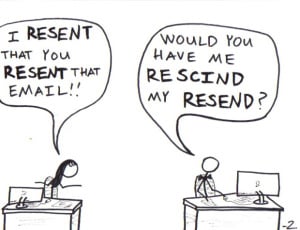Hold the “-phone” – a teacher really got fired for this?
Medical Pharmaceutical Translations • Sep 1, 2014 12:00:00 AM

A few weeks ago, teacher Tim Torkildson was fired for a blog post he’d written on his school’s website. The subject? Homophones.
If you don’t know what a “homophone” is, I imagine you’ll probably wait for me to explain, or else you’ll use an online search engine – or even a trusty print dictionary – to find out. Unfortunately, Torkildson’s employers didn’t have such a logical reaction. Without checking to be sure, they assumed the word had something to do with gay culture. Maybe they thought it was some kind of secret communication device used by the LGBT community? Neither Torkildson’s post about the firing (on his personal blog – the “homophones” post was quickly deleted from the school’s), nor news sources give an answer to this question. But what is clear is that his boss, Clark Woodger, apparently complained, “Now our school is going to be associated with homosexuality.”
A homophone is a word that sounds like another word. It’s right there in the word itself: “homo” does come from the same root as the “homo” part of “homosexual” — it’s a suffix derived from ancient Greek that means “same”. “-phone” means “sound”. People involved in education should know this – especially people at the institution in question, the Nomen Global Language Center, which specializes in teaching English as a second language! Whatever your thoughts on LGBT rights, this situation is cause for outrage.
Sadly, “homophone” isn’t the only inoffensive word that people mistakenly find offensive. It turns out there’s a lot of perfectly harmless vocabulary out there that might give the wrong impression. This site, where a forum user (jokingly) asked others to give examples of just such a thing, results in a pretty impressive list. Interestingly enough, many of the words that were suggested are terms related to grammar and linguistics. I think that has to do with a combination of factors. First off, there’s the fact that most people aren’t particularly familiar with grammatical or linguistic terminology. Plus, as the forum thread shows, a number of these words may sound similar enough to insults or slurs that it’s easy to mistake them, or at least suspect that there’s something offensive afoot (some of my favorite examples: fricative, shibboleth, diphthong, idiom….).
But shouldn’t educators be aware of at least basic grammatical terminology? You study homophones in grade school, so it’s not a particularly obscure word. And even if “homophone” slipped his mind, or if, as Torkildson claims, Woodger didn’t recognize the term to begin with, it’s strange that he didn’t think of other uncontroversial “homos” English teachers might encounter: homonyms (words that sound the same but have different meanings and spellings), and homographs (words that are spelled the same but, due to their different etymologies, have different pronunciations and meanings).
Okay, so maybe Woodger isn’t really a grammar person. But what about “homogenous” or “homogenized”or “homologous”? Sadly, he was too blinded by his homophobia to stop and think.
But ignorance and prejudice may not have been the sole culprits here. Citing an interview in The Salt Lake Tribune, this article reveals that Woodger claims school officials knew the word, but that the problem was it wasn’t worth blogging about, as the concept went over students’ heads. I find that hard to believe; in fact, homophones are likely something the school’s pupils, who are foreigners learning English, have experienced firsthand. I know I’ve written some funny (in retrospect) emails in French because of them.
This issue really comes down to one essential thing: In order for education to truly work, teachers and school leaders have to be open-minded. If not to people who are different from them, at least to fact-checking and continuing their own learning. If I were Woodger, I’d be more worried about my school losing academic credibility than anything else. Sadly, these seem like lessons that have gone over his head.
